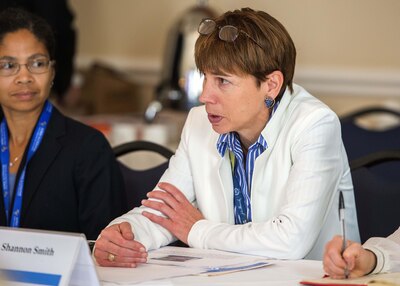By Rick Docksai DoD News, Defense Media Activity
WASHINGTON, Sept. 22, 2017 — Africa’s women are
disproportionately the victims of their continent’s armed conflicts, but they
have also been increasingly leading the way in recent years in ending conflicts
and negotiating peace.
This was the consensus of participants attending the “Women,
Peace and Security” forum consisting of women military officers, defense
analysts and conflict-resolution specialists from the United States and seven
African nations.
Building Regional Security
The forum examined women’s roles as soldiers and civilian
activists in building lasting regional stability.
The forum was organized by U.S. Africa Command’s command,
control, communications and computer systems directorate and took place Sept.
19 at the Africa Center for Strategic Studies at Fort McNair here.
The Africa Center is a Defense Department institution,
established and funded by Congress for the study of security issues relating to
Africa and serving as a forum for bilateral and multilateral research,
communication, training, and exchange of ideas involving military and civilian
participants.
‘It’s Also a Dialogue’
“Today is an opportunity to talk about peace and security
issues with female leaders from a diverse part of Africa spread across the
continent,” Ben Crockett, associate dean of the Africa Center for Strategic
Studies, said in an interview. “And it’s also a dialogue. This isn’t just the
United States providing some PowerPoint briefings. This is an opportunity to
hear from them and have a two-way conversation.”
The attendees included 12 female military officers from
Botswana, Chad, Comoros, Ghana, Madagascar, Malawi, and Uganda. All 12 were
military communications specialists visiting Washington as part of the Women’s
Communications Forum, an annual training program run by Africom, according to
Marine Corps Gunnery Sgt. Hector Milan, communications program manager with
Africom’s Engagements and Exercises branch.
Established in 2014, the program explores communications
technologies and practices in use within the U.S. military and participants’ home-country
militaries, Milan said.
Working Together
“A main goal for this program is to show not only what do we
have, but why do we use it, and how we can work together,” he said. “We want to
give the partners ideas that they can take back to their countries and
implement.”
He described a past attendee who created her own
cybersecurity program after the event, and another who convinced her military
superiors to start producing maternity uniforms for women personnel who were
mothers-to-be.
More recently, the program has broadened its curriculum to
include wider discussions about peace and security, said Malgorzata
Makuchowski, also a program manager for Africom’s engagements and exercises
branch. She explained that the forum featured these discussions.
“We wanted to take these events to a higher level and
implement peace and security into the program, as well as professional
development,” Makuchowski said.
Including More Women in Peacekeeping Efforts
Forum attendee Neyla Arnas, a senior research fellow at the
Defense Department’s Center for Strategic Research, discussed the benefits of
including more women in peacekeeping efforts. She referenced a study showing
that women civilians are more likely to report crimes -- especially sex crimes
-- to same-sex security officers and generally confide more in female
personnel.
Neyla Arnas, senior research fellow at National Defense
University’s Center for Applied Strategic Learning, discusses the benefits of
fully including women in peace negotiations and post-conflict peacekeeping
efforts.
Arnas also said that peace accords are statistically 35
percent more likely to last 15 years or longer when they include local women as
meaningful participants from the very beginning. She attributed this to women
participants calling attention to social issues that heavily impact prospects
for peace, such as health care and poverty relief.
“Women enlarge the scope of those agreements to include the
broader set of critical societal priorities and needs required for lasting
peace,” she said. “They’re thinking about the accords not only as the cessation
of violence, but what they mean in terms of reintegration of combatants,
education, social welfare programming -- those types of notions are better
integrated into a peace agreement.”
Negotiations for Peace
Shannon Smith, professor and director of engagement at the
Africa Center for Strategic Studies, described in another presentation
instances of women making more headway than men in brokering peace
negotiations, as well. For example, in south Sudan, she said, local women
leaders have started community-to-community dialogues that caused some warring
factions to cease fighting in order to talk.
“Local women were able to cross a border to create
communities to build peace among the south Sudanese, and they did so in ways
their male counterparts have never been able to,” she said.
Women’s roles in their countries’ armed forces were also a
discussion topic, Smith said. Women remain a small presence in Africa’s
militaries, she said, and the question of women serving in combat remains
controversial in Africa as it is in other parts of the world.
Smith noted that the United States’ military opened up many
combat roles to women just last year.
“I think it’s something that’s continuing to evolve, and I
think that understanding the role that women are playing in the uniformed
services is maybe one piece of changing minds and opening up opportunities,”
she said.
Smith said she hoped the forum’s attendees could help
advance the cause of women within their countries’ militaries and across
society in general.
“Every country is different,” she said. “But you are all
women leaders, and you are all rising women in your systems. And, it’s going to
be up to all of you to create the change that you want to see.”









No comments:
Post a Comment